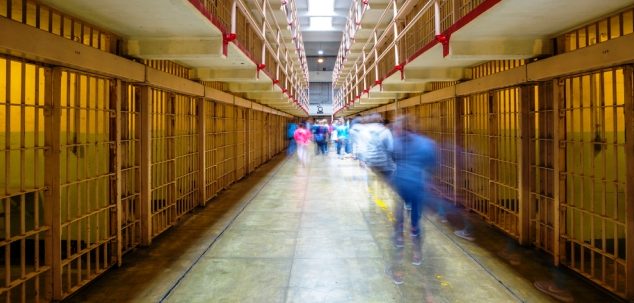News
Panel okays voting rights for former prisoners, parolees
 Visitors in the former federal prison of Alcatraz in San Francisco Bay. (Photo: Benny Marty, via Shutterstock)
Visitors in the former federal prison of Alcatraz in San Francisco Bay. (Photo: Benny Marty, via Shutterstock)Former state and federal prisoners, including those on parole, would have the right to vote in California, under a constitutional amendment approved by an Assembly committee.
The measure, ACA 6, was approved by the Democrat-controlled Assembly Elections and Redistricting Committee in a 6-1 vote and sent to the Appropriations Committee. If approved by lawmakers, it would be placed before voters on the statewide ballot for a final decision.
“The bill before us is not a vote to allow those who are on parole to vote. The bill before us is a constitutional amendment that will allow the people of California to be able to make that decision,” said Assemblymember Chad Mayes, R-Yucca Valley.
Some 40,000 in California are on parole and currently cannot vote.
Under current California law, any person who is imprisoned or on parole for the conviction of a felony is prohibited from voting and their registration is required to be canceled by election officials.
However, a person who is on probation for the conviction of a felony may vote. For those on parole, their right to vote is restored and they may re-register once parole is successfully completed.
According to a March report by a group called Initiate Justice, about 122,000 people are currently incarcerated in California and some 40,000 former inmates are on parole.
Currently, there are only two states where incarcerated individuals never lose the right to vote: Maine and Vermont. If ACA 6 were to pass and be approved by voters, California would join the ranks of 14 other states and the District of Columbia, who allow for automatic restoration of voting rights after full sentence completion.
This proposed constitutional amendment comes after a series of states, such as Florida, New York, Louisiana and Nevada, have each passed or adopted new legislation concerning prisoners and parolees’ voting rights. In particular, New York and Nevada removed all restrictions on parolees’ right to vote.
Supporters of ACA 6 argue that the lack of understanding surrounding the differences between parole and probation leads individuals to refrain from voting, out of fear of breaking the law. Supporters say that with ACA 6, the confusion over the parole-probation distinction would be resolved and eligibility requirements would be clearer to all. Backers of ACA 6 included dozens of groups, including the League of Women Voters and Secretary of State Alex Padilla, the state’s election officer.
Opponents of ACA 6 said the measure allows individuals to vote who have not yet paid their full debt to society. They contend that former criminals on parole have not yet regained the trust of society, which is why they still face various civil liberty and participatory restrictions, and that their right to vote should be limited. The principal opponent is the Election Integrity Project of California.
“Since voting is the most precious of all American civil liberties it should be the last to be regained, the greatest carrot for full reintegration and recommitment to the social contract,” said Colleen Britton of the Election Integrity Project.
Assemblymember James Gallagher, R-Nicolaus, the vice-chair of the committee, agreed.
“It seems like we kind of underscore this as no big deal and that we should do this, but there is some very good public policy reasons why you should not,” he said.
As commonly defined, parole is an early release from prison. Probation is an alternative to custody and often is imposed prior to or instead of incarceration. Both are officially supervised.
Recidivism also surfaced in the debate surrounding ACA 6: Supporters argued that voting would enable formerly incarcerated individuals to feel connected and contribute to their communities. Opponents, however, contend there is no evidence that restoring voting rights to parolees would reduce their chances of re-incarceration. Instead, they say, withholding voting rights gives parolees an incentive to behave appropriately.
—
Editor’s Note: Nahima Shaffer is a Capitol Weekly intern from UC Davis.
Want to see more stories like this? Sign up for The Roundup, the free daily newsletter about California politics from the editors of Capitol Weekly. Stay up to date on the news you need to know.
Sign up below, then look for a confirmation email in your inbox.

Leave a Reply